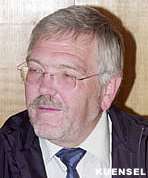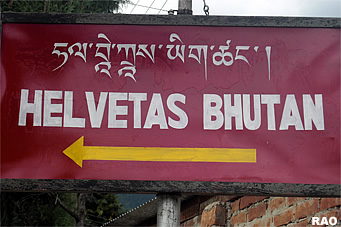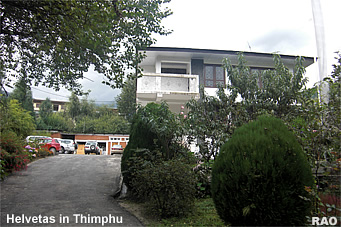 |
Helvetas
|
Swiss
Development Projects
|
 |
 |
Bhutan's Development |
 |
Bhutan Information |
|
|
 |
| Cooperation Bhutan - Switzerland |
|
Swiss support resumed - A project towards a better model of hospital management
|

|
June
2010
 |
|
An agreement signed by the health ministry on Monday will see the return of Swiss medical doctors to Bhutan, 16 years after the last one left.
The agreement resumes Swiss support to Wangdicholing hospital in Bumthang for three years. In that time, a project will be carried out, which will attempt to find a model, which increases the efficiency and quality of hospital management.
A Swiss hospital management support committee, headed by the former secretary general of Helvetas, W Külling, will provide USD 350,000 in funding.
|
|
In a departure from normal health services here, the project also aims to involve the local community in providing health care.
"A hospital doesn't just fall down from heaven or, in this case, the health ministry," said Dr Richard Frey. "Local citizens should participate in health services and support it."
Dr Frey, who served in Wangdicholing hospital in the 70's, said that, since 2000, health services in the hospital had remained almost the same. "The population has increased, the number of patients has increased, but the equipment has remained the same." He added, "There should be at least one or two doctors at the hospital, but there's only one; and sometimes, even that doctor is away, like for further training." He also explained that medical services should be available for 24 hours, which is not possible with only one doctor. "There are many things to be improved."
 |
| Former Swiss resident coordinator and secretary general of Helvetas , Mr. Werner Kuelling
In 2008, the health ministry contacted NGO Helvetas on the possibility of resuming support. In May this year, support resumed with Dr Frey, who introduced Dr B Holzer. He will remain in Wangdicholing hospital for a year.
Swiss medical support began in 1972. Two years later, a small hospital was established in Wangdicholing. In 1992 the present 40-bed hospital built by Helvetas was established. Four years later, Helvetas medical support concluded.
|
|
"In 1974 it was just a two storied building," said Dr Frey, "no water supply, no lights, wooden floors, and ceilings through which dust would fall through every time someone walked above you." With limited equipment, the Swiss doctors treated everything from bear attack victims to the common cold, he said. The present project, he said, will not only provide doctors but also equipment.
The present project, if successful, will be replicated in other dzongkhags by the government.
 |
| Source:
By Gyalsten K Dorji , KUENSEL, Bhutan's National Newspaper, 2010 |
top
|
Helvetas
renews relationship
|
 |
July
2008
One
of Bhutan's oldest and closest development partners, Helvetas or Swiss
association for international cooperation, has signed a new general cooperation
agreement, that will be valid for a period of five years or till the end
of the 10th plan.
The
new agreement was signed in Thimphu on June 30 by the foreign secretary,
Yeshey Dorji, and Helvetas resident coordinator, E W Kuelling. The
main areas of cooperation between Bhutan and Switzerland are in the RNR
sector, rural infrastructure, education and culture.
New
areas of cooperation are to be explored under the new agreement in decentralized
governance. Helvetas was the first NGO to come to Bhutan with initial
cooperation in the livestock sector. Helvetas opened its office in Thimphu
in 1983 and Bhutan established formal diplomatic relations with Switzerland
in 1985.
 |
| Source:
KUENSEL, Bhutan's National Newspaper, 2008 |
top
|
Swiss
assistance will continue till the 10th Plan
|
 |
October
2006
The
Swiss Association for International Cooperation, Helvetas might withdraw
bilateral assistance to Bhutan after the 10th Plan comes to an end (in
June 2013) according to officials of Helvetas Bhutan.
The
resident coordinator of Helvetas in Bhutan, Mr. E Werner Kuelling, said
that Switzerland had signed the Paris Declaration, which mandated that
the cooperation between industrialised and developing countries should
be more harmonised in future. "It says that the industrialised countries
should give more budget financing to the developing countries and not bilateral
project funding," he said.
"As
per the Paris Declaration Switzerland committed to withdraw bilateral project
funding and go more in multilateral funding and budget financing," Mr.
E Werner Kuelling said.
"But
it doesn't mean that we don't want to provide financial aid to Bhutan anymore,"
Mr. Kuelling added. "Helvetas would continue the bilateral projects and
it is up to the government to tell us what they really want and need."
When
Helvetas initially told the government that they would withdraw by 2008
or 2010, "there was a strong reaction from the Bhutanese government," said
Mr. Kuelling. "The government wanted us to continue the partnership when
the country was going through unprecedented transition and we agreed to
stay till the end of the 10th plan."
"After
the 10th plan we are open but nothing is certain, we will have to wait
and see," said Mr. Kuelling. "The government might tell us that it will
take over the projects or they might want us to stay. However, both the
government and Helvetas have to be willing and happy if we are to stay
after the 10th plan."
Mr.
Kuelling said that an area of interest for Helvetas was 'good governance',
which needed building up infrastructure at the gewog, district and national
level and to train people at all levels.
"Just
building up local infrastructure would not work," he said. "We have to
implement things in a more practical way to ensure that it is successful."
As
the former Secretary General of Helvetas, Switzerland for a long time Mr.
Kuelling said Bhutan had achieved the best results compared with all the
22 countries that Helvetas was operating in Asia, Africa and Latin America.
Bhutan's
success, he said, could be attributed to its excellent leaders Bhutan has
had.
Cooperation
between Switzerland and Bhutan sprang up in 1950's through friendship between
the third King and a rich Swiss businessman, Mr. Fritz Von Schulthess.
Later, few rich Swiss members provided money for development activities
in Bhutan and the "foundation pro Bhutan" was established. In 1975, Helvetas
took over the activities of the foundation.
Initial
areas of cooperation were in rural development, renewable natural resources
(RNR) and education. Future projects were also with a focus on RNR in agriculture,
forestry, livestock and environment.
In
recent years, Helvetas has committed about USD 5.00 million to USD 6.00
million annually said Mr. Kuelling.
 |
| Contributed
by Karma Choden, KUENSEL, Bhutan's National Newspaper, 2006 |
top
|
A
successful partnership
|
 |
February
2006
Describing
his tenure in Bhutan as a "fruitful and a wonderful experience" the outgoing
resident coordinator of the Swiss Association for International Cooperation
(Helvetas/SDC), Mr. Erwin Koenig, said that he was sad to leave Bhutan
at a time when the country was seeing major political and development changes.
 |
Mr Erwin König
| Mr.
Koenig, who received an audience with His Majesty the King on February
6, said that as long time development partners, Bhutan and Switzerland
had come a long way since they established relations in 1975.
Mr.
Koenig recalled how Helvetas was initially based in Bumthang which they
even called "Little Swiss valley". "It was a bit of a laboratory for us
where we carried out many different experiments," said Mr. Koenig. "Now
decades later, it is heartening to see those activities spread across the
country and doing well too." |
|
Mr.
Koenig highlighted the increasing unemployment problem among the educated
youth as a grave problem which needed to be solved. "In 1983, there were
only five Bhutanese graduates and they had difficulty in choosing their
jobs but now the situation is completely different," he said.
The
outgoing resident coordinator explained that it was important for development
partners to work together for better results. "There is nothing that you
can just pick up from your country and place it in another, how well tailored
it may be," he said. "We have our own knowledge and capacity which need
to be put to work together."
In
an interview with Kuensel the new resident coordinator, Mr. E Werner Kuelling,
who had served as the Secretary General of Helvetas/SDC for more than 30
years, said that there was no better way than to end his professional career
in international cooperation working in Bhutan. "It was my choice to come
to Bhutan," he said, "to the country where I have developed close relationships
since my first visit in 1979."
Mr.
Kuelling said that although both Helvetas and Bhutan had made mistakes in
the past the development relationship was a successful one. "Bhutan has
always been the most successful development partner of Helvetas," he said,
adding that the success story was because of a good leader and stability
in the country.
He
pointed out that the development pace in Bhutan was rather too fast. "Bhutan
should go a bit slower because development means changes and people will
have to adapt to it," he said.
Mr.
Kuelling said that creating employment opportunities and development of
the private sector were two key areas of focus during his tenure.
Since
its establishment in July 14, 1975, Helvetas has assisted in areas like
agriculture, animal husbandry, natural resources, forestry and education.
Today the bilateral development programme in Bhutan averages about seven
million Swiss Franc a year.
 |
| Contributed
by Karma Choden, KUENSEL, Bhutan's National Newspaper, 2006 |
| more information on Bhutan |
 |
| Links |
 |
 |
 |
Externe Links |
|







